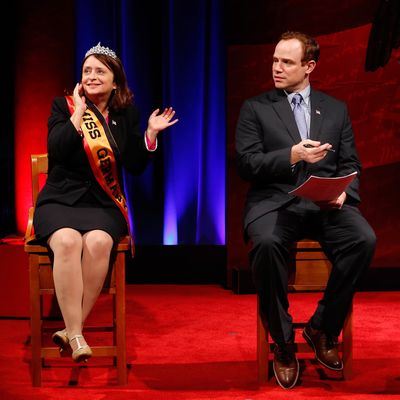
Tail! Spin! describes itself as a political comedy, and though it features politicians and is often very funny, IÔÇÖm not sure the phrase really applies. ÔÇ£Political comedyÔÇØ suggests something thatÔÇÖs fundamentally about government and ultimately happy, neither of which is the case in Mario CorreaÔÇÖs cleverly constructed sound-bite mash-up of recent sex scandals. You might wonder whether fact-based political comedy can even exist now, when governance is little more than psychopathology, and the whole thing is just plain sad.
As it has ever been? Perhaps, but thanks to social media, elected officialsÔÇÖ extramarital affairs, solicitations, underage come-ons, and general lechery have become more public and peculiar than ever. Drama canÔÇÖt really cover the territory, because these stories donÔÇÖt happen in a coherent framework of time and space. Satire is almost impossible, because the events meant to be satirized are already so extreme ÔÇö which is part of the reason Saturday Night Live has grown so lame. CorreaÔÇÖs solution may be the only viable one: the invention of a genre you might as well call documentary stand-up. He and the director, Dan Knechtges, take pains to point out that every word of Tail! Spin! was actually spoken (or texted or tweeted or posted on Facebook or otherwise) by the characters who deliver them here. And thatÔÇÖs nearly all thatÔÇÖs spoken. After a brief introduction in which our four subjects chorally take the oath of office, we meet them individually in 15-minute chapters: Sen. Larry (ÔÇ£Wide StanceÔÇØ) Craig, Rep. Anthony (ÔÇ£Dick PicÔÇØ) Weiner, Rep. Mark (ÔÇ£Congressional PageÔÇØ) Foley, and Gov. Mark (ÔÇ£Appalachian TrailÔÇØ) Sanford. One by one, on a red, white, and blue stage that looks like the setting for a televised debate, they come forward to relive their astonishingly stupid sex stories and their pathetic attempts at exculpation.
TheyÔÇÖre laughable, certainly. But theyÔÇÖre not saying much thatÔÇÖs funny. Correa tries to get around the problem of finding humor in the verbatim utterances by cutting corners. Sometimes he does this by isolating or emphasizing the second meaning of loaded words; when the men promise to ÔÇ£faithfully discharge the duties of the office,ÔÇØ itÔÇÖs the word discharge that gets declaimed in unison. Other times he forces a joke where there is none by juxtaposing unrelated statements. ThatÔÇÖs an effective tool for exposing hypocrisy, as Stephen Colbert and Jon Stewart demonstrate nightly. But as narrative humor it can feel a little jury-rigged. Also unnecessary: The accumulation of bizarre behavior eventually pushes the audience over the laugh threshold; we are left responding helplessly to real life, regardless of contrived punch lines.
The four actors playing the politicians (while doubling in the other stories as police and reporters and teenage boys) are excellent. ItÔÇÖs not just their mimicry, though Nate Smith has WeinerÔÇÖs entitled little snicker ÔÇö nyeh! ÔÇö down cold. ItÔÇÖs also their psychic burrowing. Arnie Burton as Foley and Sean Dugan as Craig nail the involuntary self-exposure of closeted men, with their fey tics and tone-deaf chatter. (Craig refers to his wife as a ÔÇ£marvelous blonde lady.ÔÇØ) Tom Galantich whips SanfordÔÇÖs baroque epistolary style into arias of smarm. (Hilariously, Knechtges has him compose one of his crazy love dissertations with a plumed pen.) And while each of the men has a totally distinct public style ÔÇö WeinerÔÇÖs snarly petulance, CraigÔÇÖs cold blandness, FoleyÔÇÖs hangdog pathos, SanfordÔÇÖs logorrheic ÔÇ£charmÔÇØ ÔÇö when they get down to the sexy business at hand they flip into the same feed-me monster mode. TheyÔÇÖre all babies.
But itÔÇÖs Rachel Dratch, playing the female characters ÔÇö ÔÇ£wives, tails, beards, and Barbara WaltersÔÇØ ÔÇö who really anchors and deepens the material. As Suzanne Craig, Huma Abedin, and Jenny Sanford, she offers an ever-changing catalogue of frozen smiles; narcotized sound bites; overeager sanctimony; and, in the case of Ginger Lee, WeinerÔÇÖs pole-dancing betrayer, dimwit hypocrisy. (Come to think of it, those traits all describe her famous Walters imitation, too.) Interviewing Jenny Sanford, switching voices line by line, Dratch reveals Walters as just another confused apologist for the male status quo. ÔÇ£I mean, do you blame yourself at all?ÔÇØ she asks, as if the wife of the man who requested her permission to sleep with his Argentine lover were somehow at fault for what happened. Jenny Sanford responds incredulously, ÔÇ£Do I blame myself? No.ÔÇØ Finally someone said it.
Tail! Spin! is at the Lynn Redgrave Theater through November 30.

